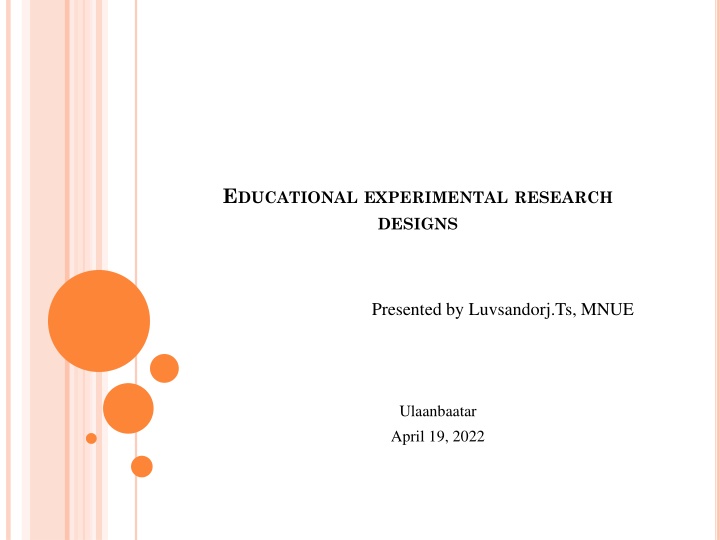
Educational Experimental Research Designs: Key Concepts & Steps
Explore the essence of educational experimental research designs as presented by Luvsandorj Ts in MNUE. Learn about experiments, research designs, steps in conducting experimental research, and more. Delve into the world of hypothesis testing, group comparisons, ANOVA, and statistical significance in educational research.
Download Presentation

Please find below an Image/Link to download the presentation.
The content on the website is provided AS IS for your information and personal use only. It may not be sold, licensed, or shared on other websites without obtaining consent from the author. If you encounter any issues during the download, it is possible that the publisher has removed the file from their server.
You are allowed to download the files provided on this website for personal or commercial use, subject to the condition that they are used lawfully. All files are the property of their respective owners.
The content on the website is provided AS IS for your information and personal use only. It may not be sold, licensed, or shared on other websites without obtaining consent from the author.
E N D
Presentation Transcript
EDUCATIONAL EXPERIMENTAL RESEARCH DESIGNS Presented by Luvsandorj.Ts, MNUE Ulaanbaatar April 19, 2022
CONTENTS Experiments Research designs Experimental research designs, key concepts The steps in conducting experimental research
WHAT IS AN EXPERIMENT? In an experiment, you test an idea (or practice or procedure) to determine whether it influences an outcome or dependent variable (Creswell, 2008, p 299)
WHAT ARE RESEARCH DESIGNS? Research designs are specific procedures involved in the last three steps of the research processes: data collection, data analysis and report writing (Creswell, 2008, p 59)
WHAT ARE EXPERIMENTAL RESEARCH DESIGNS? You use an experiment when you want to establish cause and effect between your independent and dependent variables. This means that you attempt to control all variables that influences the outcome except for independent variable (Creswell, 2008, p 299) possible -Experimental treatment (interventions) -Hypothesis, Zero hypothesis -Outcomes (response, criterion, posttest, score ) -Group comparisons (Experimental group, control group) -comparing the means and variances both within group and between groups ANOVA, T test, statistical significance (p 0.05)
WHAT ARE THE STEPS IN CONDUCTING EXPERIMENTAL RESEARCH? -Step 1. Decide of an experiment addresses your research problem -Step 2. Form hypothesis to test cause and effect relationships -Step 3. Select an experimental unit and identify study participants -Step 4. Select and experimental treatment and introduce it -Step5. Choose a type of experimental design -Step6. Conduct the experiment -Step 7. Organize and analyze the data -Step 8. Develop and experimental research report (Creswell, 2008, p325-329)
Further reading Jonh. W.Creswell.(2002). Educational Research: Planning, Conducting, and Evaluating Quantitative and Quantitative Research, by Pearson Education, Inc., Upper Saddle River, New Jersey 07458.
